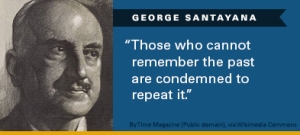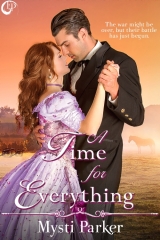This is another free week, and one of the things I’ve been working on lately is assisting one of the Eskape Press authors with her release party. Since school is out for the summer I had some extra time so I offered to read her historical romance and review it. I was enchanted by this story of a Confederate widow coming to terms with her devastating loss and a Union family living in Tennessee scrambling to make ends meet during the tumultuous years of the Reconstruction. I’ll be offering a review on my own blog later on, but I invited Mysti to come and tell us a bit about how she came to write A Time for Everything. Here she is!
****
When I first began writing A Time for Everything back in 2010, I also enrolled in a writing class at Gotham Writers Workshop. This was my first attempt at a historical romance. I had waded into uncharted waters and had yet to commit myself to the amount of research needed for this story.
 The framework of the plot was there and strong enough to build upon. Confederate widow meets Union veteran after the Civil War and both must overcome differences and social hurdles in order to fall in love. Supporting characters included African Americans as both former slaves and those who had always been free. Our villain was a former slave owner. The characters, I thought, were solid enough to turn into memorable personalities. So I decided to use parts of the draft in this class to see what I could improve upon.
The framework of the plot was there and strong enough to build upon. Confederate widow meets Union veteran after the Civil War and both must overcome differences and social hurdles in order to fall in love. Supporting characters included African Americans as both former slaves and those who had always been free. Our villain was a former slave owner. The characters, I thought, were solid enough to turn into memorable personalities. So I decided to use parts of the draft in this class to see what I could improve upon.
The class was too expensive, but at least I learned a few things. To this day, I remember one important piece of feedback from a classmate: “Don’t whitewash history.”
I couldn’t w rap my head around why he would say that. I’d avoided the use of racial slurs. I’d put the former slaves on equal ground with their white neighbors, shaking hands and chatting it up like I’d do with any of my friends of color today. Wouldn’t readers get mad at me if I wrote the “n” word and portrayed racism in its hateful reality? What did I, a middle-class white woman in the 21st century, know about the struggle of black Americans to rise out of bondage to find their place in a free world that hated them? What right did I have to portray those ugly truths as they happened?
rap my head around why he would say that. I’d avoided the use of racial slurs. I’d put the former slaves on equal ground with their white neighbors, shaking hands and chatting it up like I’d do with any of my friends of color today. Wouldn’t readers get mad at me if I wrote the “n” word and portrayed racism in its hateful reality? What did I, a middle-class white woman in the 21st century, know about the struggle of black Americans to rise out of bondage to find their place in a free world that hated them? What right did I have to portray those ugly truths as they happened?
 Then it clicked. What right did I have to NOT portray it accurately? Even a historical fiction novel must have a basis in truth for it to feel real. Perhaps the real reason I had avoided writing the negative was that it made me uncomfortable. I can’t feel guilty about slavery on a personal level because our generation cannot change the past. I don’t believe any of my ancestors ever owned slaves either, but I didn’t feel worthy to write it as it happened because I’ve never lived under the shadow of racism myself.
Then it clicked. What right did I have to NOT portray it accurately? Even a historical fiction novel must have a basis in truth for it to feel real. Perhaps the real reason I had avoided writing the negative was that it made me uncomfortable. I can’t feel guilty about slavery on a personal level because our generation cannot change the past. I don’t believe any of my ancestors ever owned slaves either, but I didn’t feel worthy to write it as it happened because I’ve never lived under the shadow of racism myself.
That’s when I decided to put the story aside until I had the skills, time, and courage to do it justice. In the fall of 2013, after I’d gotten three other books under my belt, I felt inspired to rewrite it for NaNoWriMo, a month-long writing marathon in the month of November. In 30 days, writers all over the world are challenged to write 50,000 words in a novel. I really doubted myself. For one, could I even accomplish that goal, and two, could I finally make this story into something I was proud of? I had gathered a lot of research, both from prior material and new, so I jumped into the fray.
 By the end of November, I had 50,000 words and then some. I kept writing. By the end of winter, I had a 100,000 word manuscript. I spent spring of 2014 polishing it up. I didn’t “whitewash” anything. I portrayed the events as they would have likely played out. In the end, A Time for Everything included a heart-wrenching, timeless love story in the midst of a very tumultuous time in our nation’s history. The knitting together of our country’s frayed divisions wasn’t pretty. Blacks were by no means on equal ground with whites. They were still the victims of exploitation and violence. Veterans lost limbs and livelihoods and came home as prisoners to drug addiction. Desperate times led to desperate measures, and I didn’t pull the curtain over any of it.
By the end of November, I had 50,000 words and then some. I kept writing. By the end of winter, I had a 100,000 word manuscript. I spent spring of 2014 polishing it up. I didn’t “whitewash” anything. I portrayed the events as they would have likely played out. In the end, A Time for Everything included a heart-wrenching, timeless love story in the midst of a very tumultuous time in our nation’s history. The knitting together of our country’s frayed divisions wasn’t pretty. Blacks were by no means on equal ground with whites. They were still the victims of exploitation and violence. Veterans lost limbs and livelihoods and came home as prisoners to drug addiction. Desperate times led to desperate measures, and I didn’t pull the curtain over any of it.
To my relief, beta readers and others I polled for the most part agreed that I had done the right thing in my approach. To hide any of the ugly truths under a blanket of obliviousness wouldn’t be respectful to the memories of the men, women, and children who died for the dream of a united nation. And it wouldn’t honor those who still fight for that dream today.
****
Thanks, Mysti! I have to agree with Mysti’s beta readers. Mysti’s book is wonderful. You can find it at Amazon, Barnes and Noble, Smashwords, iTunes, and other ebook outlets.
You can find Mysti on Facebook as well as her website, and on Twitter and Pinterest.


Reblogged this on Author Mysti Parker and commented:
Here’s an article I wrote about the uncomfortable issues in my new historical romance and why I chose to tell the unvarnished truth of that time period.
LikeLiked by 2 people
Thanks so much for joining us at 4F1H today, Mysti!
LikeLiked by 2 people
Thanks for hosting me. That class was expensive, but that one piece of advice stuck with me, so maybe it was worth it 🙂
LikeLiked by 3 people
Reblogged this on Have We Had Help? and commented:
From my friend Mysti 🙂
LikeLiked by 3 people
Thank you, Jack!
LikeLiked by 2 people
Waving to Mysti — how’re you doin’ today?
Delighted to have you visit here at 4F1H.
I agree you got good advice from that workshop participant. And it sounds like you took your story the right direction, around the right curves, and through he right valleys and peaks. After all, no journey of any substance is a straight and level line.
Provided you brought your characters to life — which I’m sure you did — the historically accurate circumstances and hardships they face should help readers identify with them (regardless of age or gender or position or color) and learn a lot of history besides.
LikeLiked by 1 person
Hi Jeff! So far, readers are really resonating with Portia, Beau, and all the supporting characters with several comments that they felt real to them. Someone somewhere may be offended by material in the book, but that can happen with any story.
LikeLiked by 2 people
yeah, some people are eager to be offended if you say “good morning”.
LikeLiked by 1 person
I know you’d enjoy Mysti’s book, Jeff! Mysti did a great job bringing all the characters to life.
LikeLiked by 3 people
It will be interesting to compare Mysti’s story with my own novel, “Hid Wounded Reb” which takes place in Pulaski Co. KY. Mine is a contemporary but they’re solving a cold case from the C.W. period, so I have lot of local history and context.
LikeLiked by 3 people
Always best to do a great deal of research from primary sources and document it for readers in the back. If the plot aligns with what the current majority of readers/public believe about that period of time, then it should sell.
But above all, don’t worry so much – write a good story with believable characters and people will love it.
LikeLiked by 3 people
Right, which is why I waited until I did enough research to do the story justice. Plus, I added author notes at the end about the real events and real people who played a pivotal role in middle Tennessee during that time.
LikeLiked by 3 people
Mysti, I thought you did a thorough job in your research and made your book very believable. I enjoyed reading it from start to finish.
I wish I had your writing stamina. (I’m such a lazy writer.) I’m proud of you for all you’ve accomplished.
Leo
LikeLiked by 2 people
Thanks so much for your support and encouragement Leona. ❤ You've inspired me so much and keep on doing so.
LikeLiked by 1 person
Mysti’s stamina amazes me too, Leona! She’s like the Energizer Bunny. Thank you for stopping in!
LikeLiked by 1 person
Mysti, thank you for sharing this aspect of your writing research and November NaNo rewrite after some feedback and contemplation. This is an important topic because it does seem that we say as much by what we leave out as by what we put into a story. I look forward to reading this book. The interview certainly makes it come alive.
I would like to reblog it, but since I’ve never done that before, any tips would be appreciated. Your permission would also be grand!
All best wishes for you and your book(s).
~Leslie
LikeLiked by 1 person
Thank you Leslie, yes feel free to reblog it. You should see some buttons for sharing and reblogging right under the article.
LikeLiked by 1 person
Thank you, Mysti. I appreciate your help getting me sorted. I reblogged it successfully.
LikeLiked by 1 person
Hi Mysti,
“A Time for Everything” sounds intriguing. It’s on my list for sure because I love historical fiction and it sounds like you really did your homework. I love that you had the patience until you felt you could make this story the very best version of itself. Congratulations!
LikeLiked by 1 person
Thank you Lisa! Patience is something I don’t usually have in abundance. Luckily I had plenty to keep me busy until I was ready to write it 🙂
LikeLike
Frankly, in this age, people have become too obsessed with political correctness. What happened in the past, for better or worse, cannot be changed. We, as a culture, learn from mistakes and grow from what is learned. That said, as historical authors (I write about pirates), we must be mindful, respectful, and responsible with our research.
Wonderful post, Mysti. I bet A TIME FOR EVERYTHING will be an awesome tale.
Jenn!
LikeLiked by 2 people
Thank you Jenn! Honesty really is the best policy when retelling history. Even if it’s uncomfortable to write, if not told correctly, it does a disservice to readers and the memory of those who lived and died in that time period.
LikeLiked by 2 people
Reblogged this on 2penthrupain and commented:
My friend, Mysti Parker, shares some interesting insights about research and writing historical fiction for her newest book, “A Time for Everything,’ in this interview post.
LikeLiked by 2 people
Thank you for sharing! ❤
LikeLiked by 1 person
Wonderful post. Will be looking forward to reading your book.
LikeLiked by 1 person
Thank you for stopping by, Angela! I hope you enjoy it. 🙂
LikeLike
Welcome to 4F,1H, Mysti! I am very interested in what you have written. When I moved to KY 20 years ago or so, I was surprised by the lack of racial stress in the area and heard that the former slaves were treated equally. I heard that the slaves in KY were generally treated better than other parts of the South, since the phrase “to be sent down the river” was actually used to the slaves here as a threat since to be sent down the river was to be sent to the cotton fields in the Deep South where treatment was worse and slaves lives were cheap.However, the realities were that SOME people treated former slaves well an that racial tension had been more prevalent in past generations. Now, well, overt prejudice is rare, since we have very many mixed families.
I wish you much success.
LikeLiked by 1 person
Hi Tonette, I agree with you in that some slaves had better lives than others, probably more so in KY and farther north, but they were still in bondage. That in itself was an atrocity. Prejudice still exists, but it’s so muddled up by media and politics, it’s hard to understand exactly what the issues are at times. I think we live in an era that has as much conflict as 1866, but in different forms. Human beings will never live in peace on a wide scale.
LikeLike
Oh,I am not condoning slavery in the least! I can’t imagine the very horror of it at its best. In fact,I’ll tell you a story. I happen to live in the town that has the home which inspired Stephen Foster’s “My Old Kentucky Home”. It is a tourist attraction.Unfortunately when I took the tour some years ago, the young women who were conducting the tour were very untrained and uneducated about history.As they were speaking about the duties of some of the house-slaves, (such as sitting and watching the children play), a tourist asked about the “unfairness” of the easy jobs compared to the slaves who worked in the fields and did they “trade off”. The girls agreed that they must have “tradeded off” working in the house and in fields or else it wouldn’t be fair. I mustered up plenty of boldness to speak up and tell them that there is NOTHING fair about slavery and of course they didn’t ‘trade off’! If nothing else, hadn’t they seen “Gone With the Wind”? When Scarlett brought the cow home the butler siad that they were ‘house help’ and knew nothing about animals? I was livind! They figured there was “Fairness” in slavery!
Poepel don’t think, and books like yours can open eyes.
LikeLiked by 1 person
I’ve never been on a tour there, but have seen the house and such. Lovely place. Tour guides should definitely be up on their history. On large plantations like that, there were divisions among slaves. Field hands were much lower in social status and less expensive than domestic help or those who had specialized skills like blacksmithing. This article compares the prices of slaves to today’s dollars. Your average poor, working class Southerner could not afford slaves. http://www.measuringworth.com/slavery.php
LikeLike